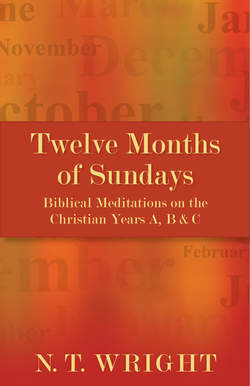Читать книгу Twelve Months of Sundays - N.T. Wright - Страница 24
На сайте Литреса книга снята с продажи.
ОглавлениеProper 3
Leviticus 19.1– 2, 9–18
1 Corinthians 3.10–11, 16–23
Matthew 5.38–48
There are two basic mistakes people make about the command to love your neighbour as yourself. The first is to forget the last two words. We aren’t told to love our neighbour with all our heart, mind, soul and strength; only God has that absolute claim. We are to love our neighbour no more, but no less, than we love ourselves.
This will vary according to whether we are naturally selfish people, who pamper ourselves, or of an ascetic temperament, rebuking and restricting our fleshly desires. It might be fun, for a while, to be loved by the first sort of person as they loved themselves; the second sort, obeying the commandment, might be uncomfortable neighbours.
But here the second mistake kicks in. We are not left without guidance as to how we should love ourselves. True, the lectionary does its best to shield us from the sterner parts of that instruction, as the omitted verses from 1 Corinthians 3 reveal. Verses 12–15 are vital and unique, speaking of the future judgement which will be passed, not on non-Christians, but on Christians themselves, indeed, on Christian workers. Paul uses imagery not just from house-building but from temple-building: he is, after all, building the new temple, the community in which God’s Spirit truly dwells. Sooner or later fire will test that building, and only the proper materials will last. Builders who have used wood, hay and stubble – jerry-builders who haven’t really taken the trouble to do properly the work to which they were called – will discover too late that it all goes up in smoke.
With warnings like this, a proper self-love cannot afford to be complacent. Self-respect, yes, as long as it doesn’t become an excuse for sloppy thinking or behaviour (‘this is just the way I am’); self-care, yes, as long as it is appropriate and not pampering or greedy. But above all, respect for one’s own outward-looking vocation: not, how can I feather my own nest, but how can I be true to what God has called me to be for his Church and world? And if that’s what self-love looks like, love of neighbour must be the same: neither an easygoing tolerance of everything a neighbour may do, nor a confrontational bossiness. Leviticus commands a string of practical measures which, culturally translated, give vivid clues to the true approach.
Matthew 5, in turn, suggests a cheerful, almost playful approach (granted that most neighbours today won’t strike us on the cheek or pressgang us into carrying military equipment for a mile). Jesus is not asking us to be doormats, but to find creative non-violent ways forward in difficult situations. Ultimately, both self-love and neighbour-love derive from love of God: the steadfast, devoted gaze at our creator and redeemer through which we discover the pattern for those made in his image. If we are called to be God’s holy temple, nothing less will do.
